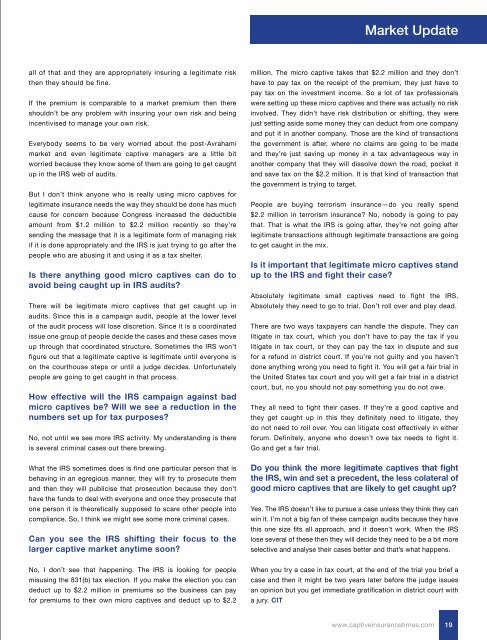Captive Insurance Times issue 145
In issue 145 of Captive Insurance Times, we focus on the Internal Revenue Service's ongoing campaign against illegitimate micro captives. Philip Karter, Scot Kirkpatrick, and Christopher Steele, attorneys at Chamberlain Hrdlicka, discuss the landscape of the micro captive market and the after-effects of the Avrahami case. You will also find our round-up of all the latest news and industry appointments. Don't forget to visit www.captiveinsurancetimes.com to read the latest news, scan the most recent issues, or check out upcoming events.
In issue 145 of Captive Insurance Times, we focus on the Internal Revenue Service's ongoing campaign against illegitimate micro captives.
Philip Karter, Scot Kirkpatrick, and Christopher Steele, attorneys at Chamberlain Hrdlicka, discuss the landscape of the micro captive market and the after-effects of the Avrahami case.
You will also find our round-up of all the latest news and industry appointments.
Don't forget to visit www.captiveinsurancetimes.com to read the latest news, scan the most recent issues, or check out upcoming events.
Create successful ePaper yourself
Turn your PDF publications into a flip-book with our unique Google optimized e-Paper software.
Market Update<br />
all of that and they are appropriately insuring a legitimate risk<br />
then they should be fine.<br />
If the premium is comparable to a market premium then there<br />
shouldn’t be any problem with insuring your own risk and being<br />
incentivised to manage your own risk.<br />
Everybody seems to be very worried about the post-Avrahami<br />
market and even legitimate captive managers are a little bit<br />
worried because they know some of them are going to get caught<br />
up in the IRS web of audits.<br />
But I don’t think anyone who is really using micro captives for<br />
legitimate insurance needs the way they should be done has much<br />
cause for concern because Congress increased the deductible<br />
amount from $1.2 million to $2.2 million recently so they’re<br />
sending the message that it is a legitimate form of managing risk<br />
if it is done appropriately and the IRS is just trying to go after the<br />
people who are abusing it and using it as a tax shelter.<br />
Is there anything good micro captives can do to<br />
avoid being caught up in IRS audits?<br />
There will be legitimate micro captives that get caught up in<br />
audits. Since this is a campaign audit, people at the lower level<br />
of the audit process will lose discretion. Since it is a coordinated<br />
<strong>issue</strong> one group of people decide the cases and these cases move<br />
up through that coordinated structure. Sometimes the IRS won’t<br />
figure out that a legitimate captive is legitimate until everyone is<br />
on the courthouse steps or until a judge decides. Unfortunately<br />
people are going to get caught in that process.<br />
How effective will the IRS campaign against bad<br />
micro captives be? Will we see a reduction in the<br />
numbers set up for tax purposes?<br />
No, not until we see more IRS activity. My understanding is there<br />
is several criminal cases out there brewing.<br />
What the IRS sometimes does is find one particular person that is<br />
behaving in an egregious manner, they will try to prosecute them<br />
and then they will publicise that prosecution because they don’t<br />
have the funds to deal with everyone and once they prosecute that<br />
one person it is theoretically supposed to scare other people into<br />
compliance. So, I think we might see some more criminal cases.<br />
Can you see the IRS shifting their focus to the<br />
larger captive market anytime soon?<br />
million. The micro captive takes that $2.2 million and they don’t<br />
have to pay tax on the receipt of the premium, they just have to<br />
pay tax on the investment income. So a lot of tax professionals<br />
were setting up these micro captives and there was actually no risk<br />
involved. They didn’t have risk distribution or shifting, they were<br />
just setting aside some money they can deduct from one company<br />
and put it in another company. Those are the kind of transactions<br />
the government is after, where no claims are going to be made<br />
and they’re just saving up money in a tax advantageous way in<br />
another company that they will dissolve down the road, pocket it<br />
and save tax on the $2.2 million. It is that kind of transaction that<br />
the government is trying to target.<br />
People are buying terrorism insurance—do you really spend<br />
$2.2 million in terrorism insurance? No, nobody is going to pay<br />
that. That is what the IRS is going after, they’re not going after<br />
legitimate transactions although legitimate transactions are going<br />
to get caught in the mix.<br />
Is it important that legitimate micro captives stand<br />
up to the IRS and fight their case?<br />
Absolutely legitimate small captives need to fight the IRS.<br />
Absolutely they need to go to trial. Don’t roll over and play dead.<br />
There are two ways taxpayers can handle the dispute. They can<br />
litigate in tax court, which you don’t have to pay the tax if you<br />
litigate in tax court, or they can pay the tax in dispute and sue<br />
for a refund in district court. If you’re not guilty and you haven’t<br />
done anything wrong you need to fight it. You will get a fair trial in<br />
the United States tax court and you will get a fair trial in a district<br />
court, but, no you should not pay something you do not owe.<br />
They all need to fight their cases. If they’re a good captive and<br />
they get caught up in this they definitely need to litigate, they<br />
do not need to roll over. You can litigate cost effectively in either<br />
forum. Definitely, anyone who doesn’t owe tax needs to fight it.<br />
Go and get a fair trial.<br />
Do you think the more legitimate captives that fight<br />
the IRS, win and set a precedent, the less colateral of<br />
good micro captives that are likely to get caught up?<br />
Yes. The IRS doesn’t like to pursue a case unless they think they can<br />
win it. I’m not a big fan of these campaign audits because they have<br />
this one size fits all approach, and it doesn’t work. When the IRS<br />
lose several of these then they will decide they need to be a bit more<br />
selective and analyse their cases better and that’s what happens.<br />
No, I don’t see that happening. The IRS is looking for people<br />
misusing the 831(b) tax election. If you make the election you can<br />
deduct up to $2.2 million in premiums so the business can pay<br />
for premiums to their own micro captives and deduct up to $2.2<br />
When you try a case in tax court, at the end of the trial you brief a<br />
case and then it might be two years later before the judge <strong>issue</strong>s<br />
an opinion but you get immediate gratification in district court with<br />
a jury. CIT<br />
www.captiveinsurancetimes.com<br />
19

















